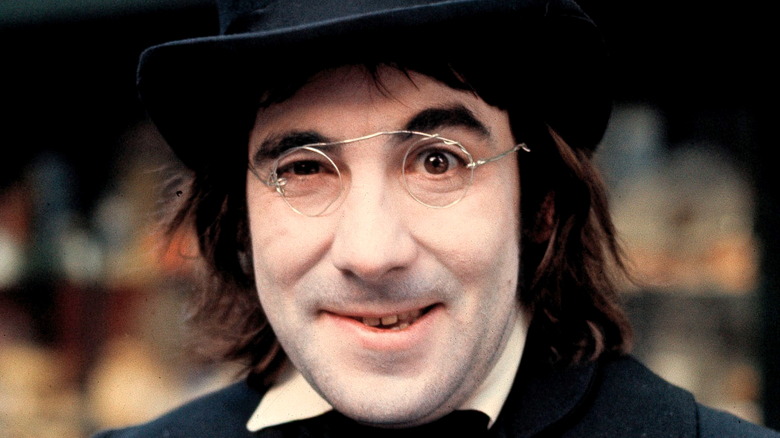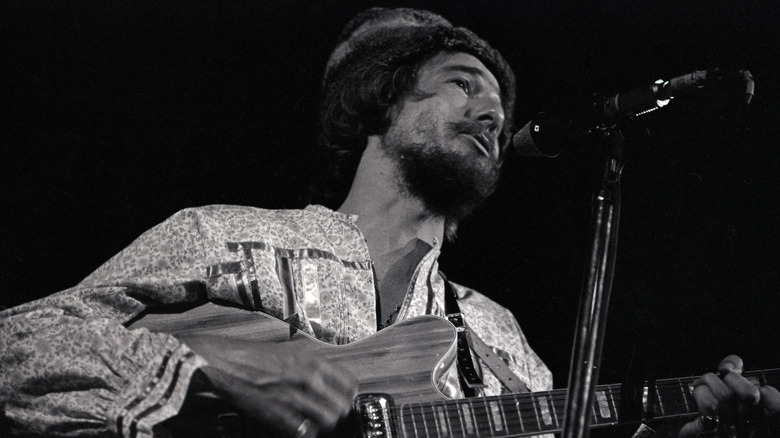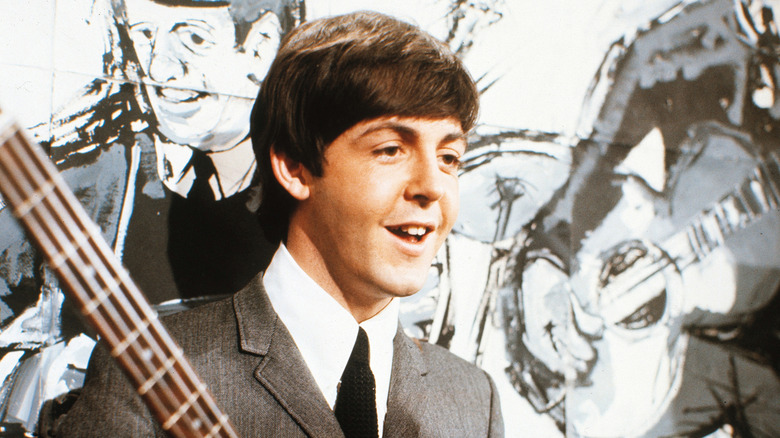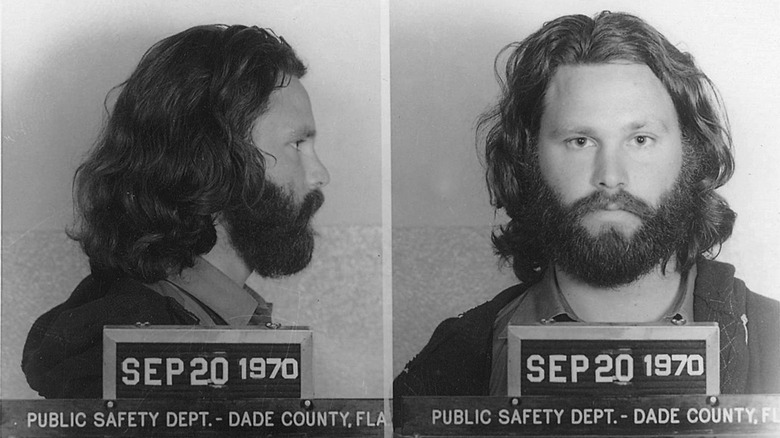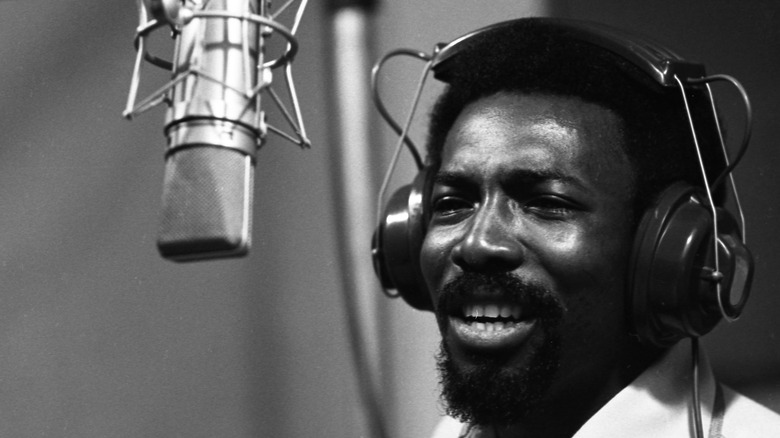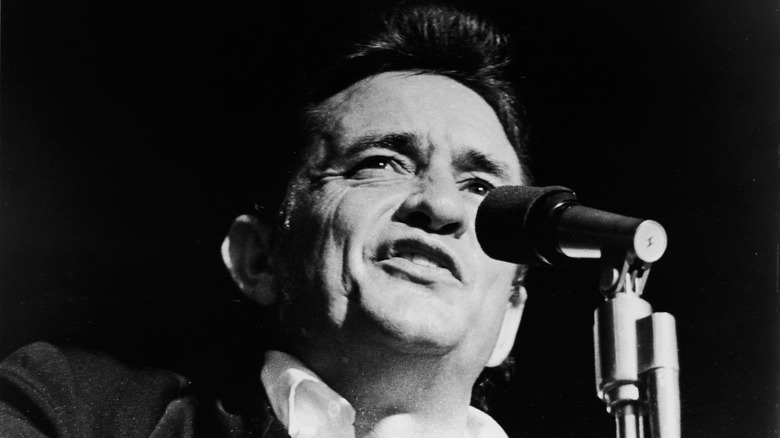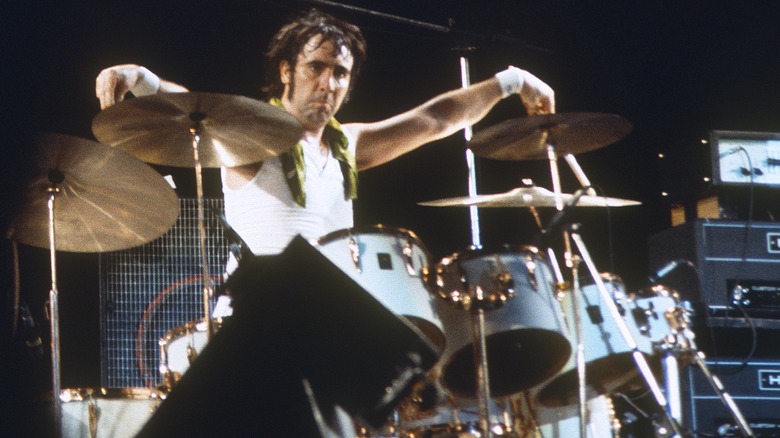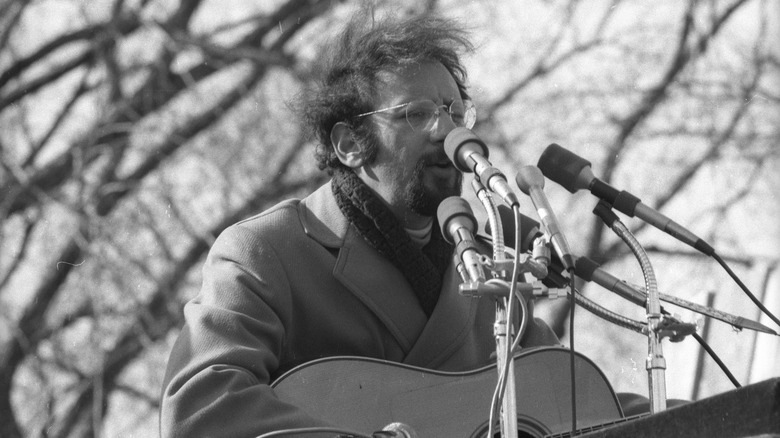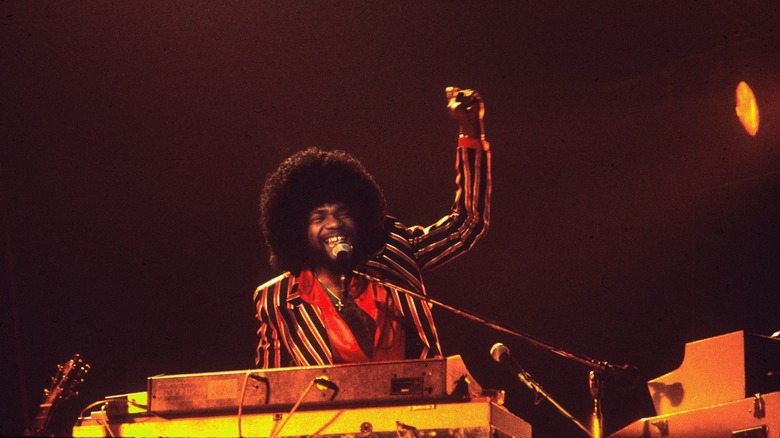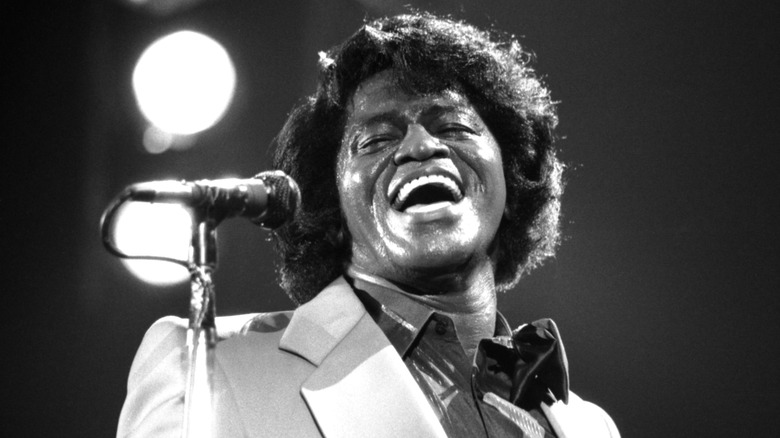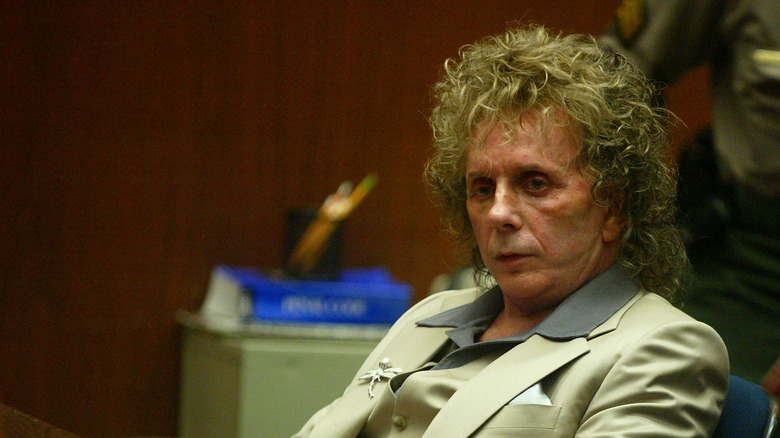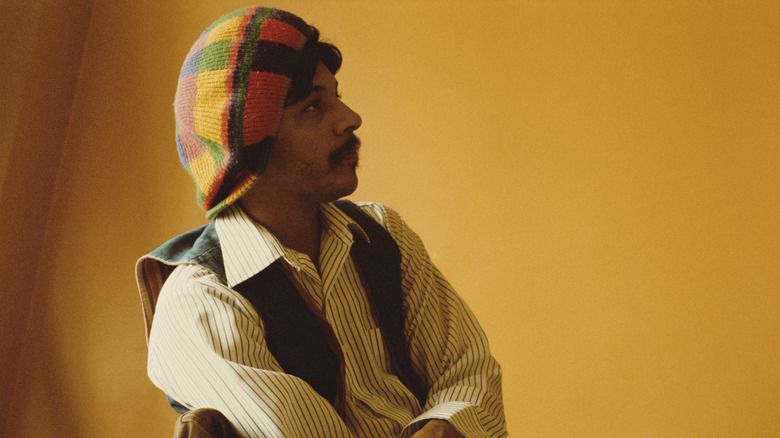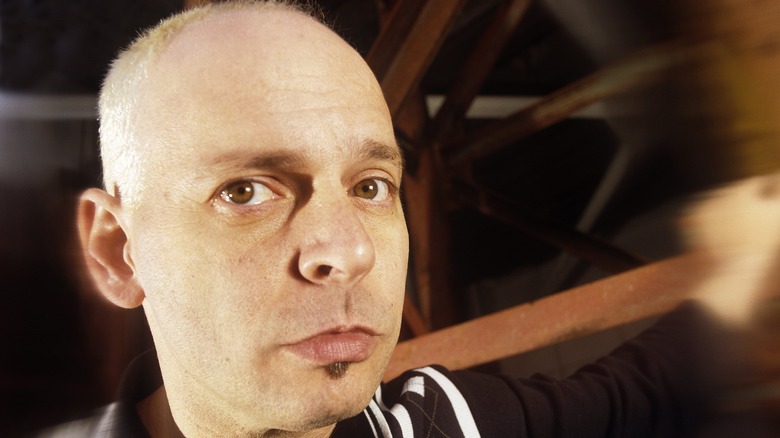'60s Rock Stars Accused Of Serious Crimes
It's hard to think of a decade that was more fertile to rock music than the 1960s. The British Invasion, advances in recording technology, and the growing prominence of television all led to countless new sounds and new stars. But it's hard to have that many stars without finding trouble along the way. Sometimes people made their own trouble, and sometimes they were just victims of circumstance. Often this went beyond the pot busts stereotypically associated with the decade, well into dark and scary territory.
Many rock stars admitted to their crimes, while others were proven. And still other accusations ended up being incorrect or overblown. Some might never be truly confirmed because too many parties involved are dead.
Here are some '60s rock stars accused of serious crimes.
John Phillips
"Papa" John Phillips was one of the most important musicians of the '60s, due to his work with The Mamas & the Papas. He was also a sick man, with a life marked by drug addiction and unstable relationships. In 2009, his daughter, Mackenzie Phillips — a successful actress and singer in her own right — leveled a shocking allegation against him: that they'd had an abusive relationship throughout the early part of her life.
In her book "High on Arrival," and in a subsequent interview on "Oprah," Mackenzie claims she awoke to him assaulting her around age 17, and that it went on for a decade. It only ended after she got pregnant and got an abortion. "I never let [my father] touch me again," she said.
TV Guide aggregated several responses from the Phillips family and, while all parties involved acknowledge that John wasn't exactly a saint, they're all of different minds on Mackenzie's allegations. John's ex-wives, Michelle Phillips and Geneviève Waite, didn't believe the allegations, with the former claiming Mackenzie was mentally unwell and the latter not believing John capable of it. Chynna Phillips fully believes her half-sister. Jessica Woods, daughter of John's bandmate Denny Doherty, emailed "Oprah" and said, "Everything she said is true. My dad told me the awful truth. He was horrified at what John had done and knew all of it."
If you or anyone you know has been a victim of sexual assault, help is available. Visit the Rape, Abuse & Incest National Network website or contact RAINN's National Helpline at 1-800-656-HOPE (4673).
Paul McCartney
On January 16, 1980, Paul McCartney flew into Tokyo to kick off a tour of Japan with his band, Wings. As History details, upon arrival, Japanese authorities found about half a pound of marijuana in McCartney's belongings and arrested him. He was charged with smuggling, even though he claimed it was for personal use — which didn't exactly help his case. The entire ordeal saw him detained for nine days before getting deported from the country.
It's true that The Beatles were always associated with drug use. And, even though it's still illegal in many places, a rock legend smoking a joint is largely a victimless crime.
That is, unless you're in Japan — a country with both stringent drug laws and, as Vice notes, a strong social stigma against drug use. Though the legal consequences are enormous, the social consequences are life changing. As Japan-based journalist Brian Ashcraft explained in a column on Kotaku, "If you're in Japan, keep this mantra in mind: Never do drugs in this country. Ever." Besides the risk of lengthy jail sentences, stars — big and small — have seen their careers come to screeching halts after getting charged with drug possession.
McCartney got off easy. In 2004, he revealed why he was so cavalier about taking drugs on a plane: "This stuff was too good to flush down the toilet, so I thought I'd take it with me."
Jim Morrison
In March of 1969, The Doors performed in Miami, Florida. Lead singer Jim Morrison was, by most accounts, drunk and erratic. By some accounts, he taunted the crowd and exposed himself. This led to him getting charged with a felony and three misdemeanors for his behavior.
Whether or not he disrobed is a source of contention to this day, but there's a preponderance of evidence that he didn't. History notes that almost all the witnesses for the prosecution had connections to the cops or the district attorney. Indeed, the Miami Herald interviewed at least three people in attendance, all of whom deny that Morrison dropped trou except for an off-duty cop present that night. Doors drummer John Densmore told The Hollywood Reporter (via Reuters) that "he didn't do it! I was there; if Jim had revealed the golden shaft, I would have known. There were hundreds of photographs taken and tons of cops and no evidence."
Either way, the trial ended with Morrison convicted of indecent exposure and open profanity. Morrison posted bail and was still appealing his conviction when he died in France. In 2010, Florida Gov. Charlie Crist posthumously pardoned Morrison. Per Reuters, Crist said this was because Morrison's death robbed him of the right of appeal.
Wilson Pickett
Wilson Pickett gave us "Land of 1000 Dances" in the mid '60s. He also became the "Man of a Dozen Crimes" in the '90s, most of them drunk-driving related.
In 1991, Pickett was charged with drunk driving after flooring his Chevy Silverado over his neighbor's yard, UPI reported. This neighbor just happened to be the mayor of Englewood, New Jersey. UPI also reported that Pickett yelled, "I'm going to kill that ... mayor." Jet reported that Pickett agreed to perform a charity concert in order to have the charges dropped.
This was far from the end of his problems with drunk driving: While intoxicated behind the wheel, Pickett drove his car into an 86-year-old pedestrian in 1993. The AP (via the New York Times) reported a strict sentence for that one: one year in prison, five years' probation, a $5,000 fine, alcohol treatment, and 200 hours of community service. No charity concert here.
Johnny Cash
Much of Johnny Cash's mystique was wrapped up in his outlaw image. The black suits, the legendary live albums recorded in prisons, and enough drugs and bad decisions to fill a biopic helped maintain that image. Even so, he never spent all that much time in a jail cell, recounting one such time where he got locked up for trespassing and picking flowers in "Starkville City Jail." That said, he did face trouble with the federal government on one big occasion: when they accused him of burning down a national forest.
On June 27, 1967, Cash was — one way or another — at the center of a massive fire in Los Padres National Forest. Cash's FBI file, acquired by MuckRock, claimed the fire was started by a "defective exhaust system" on Cash's camper. Damon Fielder, Cash's nephew and camping buddy that day, had a different story: The Los Angeles Times reports that he saw his uncle fanning a fire he lit himself, likely drugged out of his mind and trying to stop it.
Cash wrote in his 1997 autobiography (via the VC Star) that during this time he was drugged to the gills and ready to fight. During a deposition, upon being told that the fire scared off or killed dozens of California condors, he responded, "I don't give a damn about your yellow buzzards." When asked in court if he started the fire, he snapped back: "No, my truck did and it's dead, so you can't question it." Cash ultimately paid $82,000 in damages.
Keith Moon
The Who were synonymous with destruction, and drummer Keith Moon in particular has his share of wild stories. Many of those stories are tragic, including the little-remembered incident where he accidentally killed a man. The precise details are a bit fuzzy, but contemporaneous coverage by Rolling Stone and research by journalist and Moon biographer Tony Fletcher suss out a sorry scene.
In January of 1970, Moon and some friends visited a pub in Hatfield, Hertfordshire. Among those friends was Neil Boland, a chauffeur he hired with the expectation of being wasted. When the group left the pub, they were accosted by skinheads, who weren't pleased seeing a rich man with a fancy car in their neighborhood. Boland either left the car or was pulled out, at which point Moon took the wheel and drove to safety — unknowingly driving over, dragging, and killing Boland.
Moon pleaded guilty to drunk driving, driving without a license, and driving without insurance. Even so, after more details emerged, the court cleared him of all charges. According to Rolling Stone, the judge even said that "you had no choice but to act the way you did and no moral culpability is attached to you."
Even though he was exonerated, Moon was wracked with guilt. Pamela Des Barres, a famous groupie and brief romantic partner of Moon, recalled that he once broke down and claimed he was a murderer. "He would wake up screaming," she told The Sun. "It was so sad because it was obviously an accident but he blamed himself."
Peter Yarrow
Peter Yarrow is best known as the "Peter" in Peter, Paul, and Mary. He's remembered as much for his peace activism as he is for "Puff, the Magic Dragon." He was also convicted of assaulting a teenage girl in 1969, a charge to which he has openly and repeatedly admitted.
The victim, who identified herself as Barbara Winter to the Washington Post, recalled that her older sister was president of a Peter Yarrow fan club in Washington, D.C. The two were invited to his hotel room, where he answered the door nude and assaulted Winter, who was 14 at the time. Yarrow pled guilty to "immoral and improper liberties" and was sentenced to one-to-three years in prison, with all but three months suspended. He's often called it "the worst mistake I have ever made." A decade later, he petitioned President Jimmy Carter for a pardon, a petition supported by powerful political friends. He was granted a pardon on Carter's last day in office, to the disgust of the Winter family.
The Post also reported that this was far from the only time Yarrow was accused of this. Winter's family sued him on top of the criminal charges, claiming the molestation continued. This ended with an undisclosed settlement. An old article from the Cincinnati Enquirer reported (via the Post) that the father of a 15-year-old girl made similar charges in 1967, only to be ignored by a grand jury. Another woman sued Yarrow in February of 2021, claiming that he groomed and assaulted her in 1969. A settlement was reached around April.
Billy Preston
Billy Preston had a few solo hits, including two No. 1's in "Will It Go Round in Circles" and "Nothing From Nothing," but he's probably best remembered as one of the most important sidemen in rock history. He performed with everyone from Little Richard to the Red Hot Chili Peppers, but his time with The Beatles stands out. His obituary in the New York Times notes that he's the only man to ever share a credit with The Beatles with "Get Back." He was part of their legendary rooftop concert chronicled in "Let It Be."
That same obituary states that Preston also had a severe drug problem. His issues became especially pronounced in the '90s. He pled no contest to assault and cocaine possession charges in 1992 and spent the next nine months at court-ordered rehab. He was sent to prison again in 1997 after violating probation.
But drug addiction is more an illness than a crime. His most serious crime was the $1 million insurance fraud scheme, which he was charged with while already serving time.
The indictment in 1998, as documented by the Los Angeles Times, claimed that Preston, his manager, and at least five other people burned their own houses and faked burglaries for almost a decade to scam insurance companies. Preston pled guilty a month later and cooperated with prosecutors, with his publicist telling the AP that "Preston has taken responsibility for his past mistakes and is looking forward to the future."
James Brown
James Brown's many criminal charges, from the alleged to the convicted to the confessed, are numerous enough to fill a book. This includes multiple lawsuits from women accusing him of assault.
The most prominent and public of his accusers was Jacque Hollander, who told her story in depth to CNN. Then a songwriter, she worked with him on a charity single. She claims that he assaulted her in 1988 and later blacklisted her from the music business. Hollander spent years trying to get her case heard, to no avail. She eventually tried suing him in 2005, saying the stress from the assault gave her Graves disease, but (per the Chicago Tribune) it was dismissed for being past the statute of limitations.
CNN also uncovered three other lawsuits against Brown, each from women he employed, and each claiming in gruesome detail how he demanded sexual favors from them. Two were withdrawn, and one resulted in a jury finding him liable for wrongful termination but not sexual harassment.
If you or anyone you know has been a victim of sexual assault, help is available. Visit the Rape, Abuse & Incest National Network website or contact RAINN's National Helpline at 1-800-656-HOPE (4673).
Phil Spector
It's strange to call a producer a "rock star," but it's the best way to describe Phil Spector. He was behind some of the biggest pop and rock hits of the decade, creating the "Wall of Sound" production technique and masterminding many of the girl groups of the era.
He was also a convicted murderer and was serving 19 years to life at the time of his death. His obituary from CBS breaks down the case.
In 2003, Spector met actress Lana Clarkson. They both went back to his mansion. Shortly after arriving, Spector's chauffeur later testified that Spector came out holding a gun and covered in blood, exclaiming that he might have shot someone. Clarkson was found dead in his house, which kicked off nearly a decade of legal action.
Spector was notorious for showing up to court in ridiculous outfit and unusual wigs, and a murder charge became a media circus. Spector maintained that Clarkson shot herself, but some damning testimony and his history of threatening women under his employ was used against him. The first trial ended in a hung jury, voting 10-2 in favor of conviction. The second one ended in a conviction, which sent him to prison for the rest of his life. He died in January 2021 of COVID-19, reports the New York Times.
Arthur Lee
You might not recognize the name Arthur Lee, but you'll probably recognize him in the context of his band: Love. Best known for seminal psychedelic rock album "Forever Changes," they were an instrumental part of the mid-60s trippy rock movement. Later in his life, long after Love broke up, Lee got into a bunch of trouble — including some that put him in prison for half a dozen years.
The Guardian recounted Lee's legal woes during a profile: In June 1995, Lee was arrested for firing a handgun into the air outside his apartment. That's it, by the way — that's the whole crime. A negligent discharge that harmed exactly no one is hardly a serious crime ... right? Well, not according to the state of California. Lee previously spent a few years in the pen for arson and had a smattering of other drug and assault charges to his name. They wanted him bad, so he was tried and sentenced to 12 years.
Lee spent several years fighting the charge from prison. After six years, a federal appeals court overturned the charge because the original prosecutor was guilty of misconduct. Lee's lawyer, William Genego, told Rolling Stone that there was also "very strong defense evidence that someone else had fired the gun. In fact, the person came forward and said that he [and not Lee] had fired the gun ..."
After his release, Lee told the Guardian, "I'm not the first Black man to be framed and I won't be the last."
Wayne Kramer
Wayne Kramer made his name as the guitarist for proto-punk band MC5, best known for "Kick Out The Jams." The band had a short run, and Kramer is almost better remembered for his battle with addiction than his riffs.
"My life had been the MC5," he recalled in an interview with Please Kill Me. "I was totally consumed with it from the time I was 15, 16 years old until, up to when the band broke up in 1972. It was a terrible, acrimonious, bitter break-up ... And my drug addiction was the perfect solution for it." Kramer notes that drugs are an expensive habit, and as such he became a dealer. It was a two-birds-one-stone situation: He could get money for more drugs while skimming some for himself. His autobiography, "The Hard Stuff," (excerpted in the Detroit Free Press) describes many close calls with death.
This all came to an end when he dealt drugs to federal agents. Kramer originally thought he was getting ripped off, and when he realized they were feds, "I thought, great news! The federal system is better than the state system" (as per Please Kill Me). Kramer spent four years in federal prison. He is now sober and runs the U.S. chapter of Jail Guitar Doors, a nonprofit that provides instruments to prisoners — and one named after a Clash song about him.
If you or anyone you know is struggling with addiction issues, help is available. Visit the Substance Abuse and Mental Health Services Administration website or contact SAMHSA's National Helpline at 1-800-662-HELP (4357).
